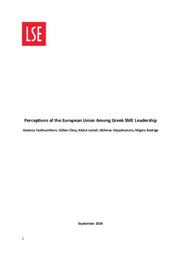Today, leadership is a word that encompasses far greater meaning than it did for me two years ago. Two years ago, leadership was synonymous with success; the leader as the one who was there to 'lead' others; and as much as teamwork was an inherent part of being a leader, it was also ultimately a very individualistic role. Now, I look at leadership as a very personal thing: it means to be resilient when times are difficult, it means problem solving and critical thinking, and it means being true to yourself and your own values even if it means facing social disapprobation. Being a leader is to accept and acknowledge the difficulty of a challenges but to nevertheless persevere. Being a leader is to ask challenging and difficult questions about whether policies or systems that are in place are really working and serving those who they are designed to serve, even at the risk of upsetting of the status quo. This was best demonstrated in our leadership project when we asked difficult questions about Euroscepticism, national identities, and whether the economic system created by the European Union for its Member States were serving those most impact by it – Small Medium Enterprises (SMES).
Over the last two years, leadership has taught me the value of being flexible and how to navigate a life of uncertainty and to see each opportunity as that – an opportunity. Instead of seeing the future as set in a certain career path, engaging in the Laidlaw programme has encouraged to think more widely about what I want to experience rather than necessarily achievements to place under my belt. Speaking to local stakeholders in Greece and London, policy makers, start-up owners who pivoted careers to take advantage of new opportunities: these conversations have demonstrated to me the value of seeing the future as an open and malleable space.
I’ve learnt to take more risks and to ask questions. When beginning the programme, I wanted to develop my ability to create dialogue and being able to engage with local stakeholders from Greece and in London during both my projects allowed me greater interactions with groups of people who I may not have met in any circumstance: I learnt to ask informed and thoughtful questions and also to ask when I didn't know things. I am surprised at how much I have developed my resilience and flexibility in being able to face and workaround challenges that came up throughout the leadership project but also in the last two years of the LSE - learning to contextualise events and challenges have been a cornerstone to my development. I'm surprised by the strong friendships I created through the Laidlaw programme with curious and socially engaged people and how these people have never failed to surprise and inspire me. Ultimately, being a leader is also being able to learn from others.
This programme has taught me so much about resilience, has put me in touch with some incredible people who I have no doubt will go on to do great things, and has encouraged me to take more risks and engage in different opportunities that might be different. As a global citizen, it has encouraged me to create dialogue with people from different backgrounds and travel to different places to understand and experience the local culture - it's given me the opportunity to hear some great stories and develop my own story. Professionally and academically, I have become really interested in the venture space and creating companies that have good impact on the environment and has inspired me to centre my dissertation on this. It has helped me develop my interest in the venture ecosystem and to ask questions of where value might be added, and how things can be changed. Looking forward to the future, it has taught me the importance of creating a network of great relationships, of asking important questions, and of taking risks.


Please sign in
If you are a registered user on Laidlaw Scholars Network, please sign in